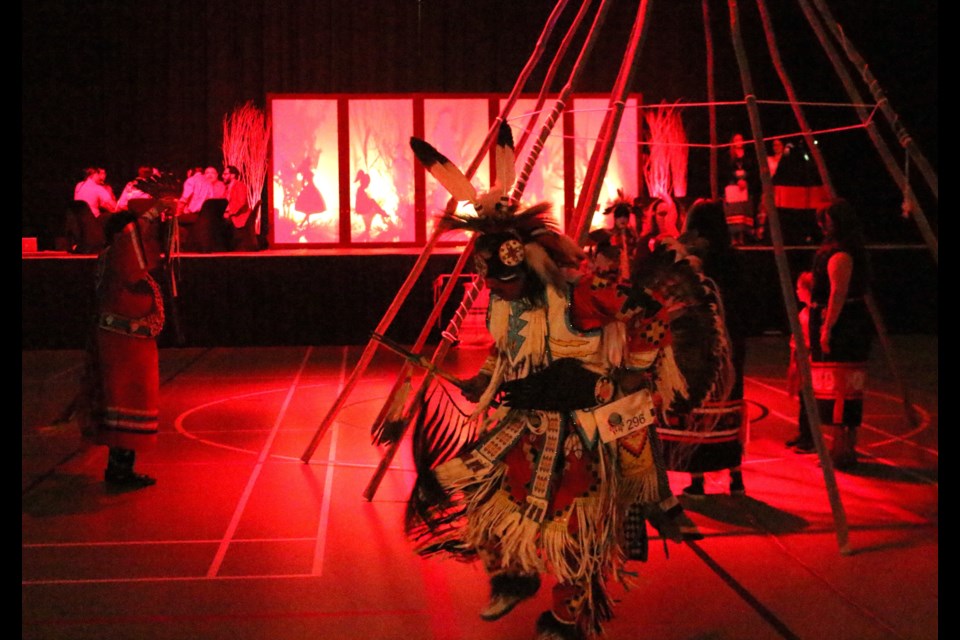BONNYVILLE – Everything was touched by the glow of red light at the annual MMEIP (Murdered or Missing and Exploited Indigenous Peoples) and Stolen Children Vigil held on Oct. 4 at the Bonnyville and District Centennial Centre.
In Alberta, Oct. 4 is recognized as Sisters in Spirit Day, which honours the lives of missing and murdered Indigenous women and girls (MMIWG), their families, and loved ones.
The rate of murdered and missing people is disproportionately higher among Indigenous women, girls, men and two spirited people than non-Indigenous people in Canada.
“Between 1980 and 2014, there were 6,849 police-reported female homicide cases in Canada. Among the total number of female victims, 16 per cent were Indigenous women,” states information released by the Government of Canada’s Research and Statistics Division.
“Since 1991, the number of murdered non-Indigenous women has declined. In contrast, the number of murdered Indigenous women has remained relatively stable, thus accounting for an increasing proportion of Indigenous female homicide victims.”
In 2014, the rate of homicide of Indigenous women was almost six times higher than non-Indigenous women, according to the Government of Canada.
With more attention being drawn to the prevalence of violence directed toward Indigenous women and girls, the insidious reality of exploitation is now beginning to enter the conversation.
Acknowledging exploitation as a pillar of harm done to Indigenous people has led to a change in terms used to mark a movement of awareness often symbolized with a red dress.
This year, the Bonnyville Friendship Centre’s annual vigil honoured Murdered, Missing and Exploited Indigenous People as well as the stolen children.
It starts with exploitation
CEASE, the Centre to End All Sexual Exploitation, is an organization based out of Edmonton that works with sexual exploitation and human trafficking.
“Many of the women that we serve are Indigenous women, and they come from up north as well,” Liz John-West, the executive director of CEASE, told Lakeland This Week.
John-West explained the organization often sees women who have moved to the city that find themselves in situations where they are being exploited or trafficked by an intimate partner or through other means. When these women are discovered by police, medical professionals, social workers or child welfare workers, they are referred to CEASE for support.
“When we look at human trafficking, we think it's over there. It's in Cambodia, it's in India, it's Eastern Europe. However, it exists within our own country where women are lured into the trafficking world through the romance of a relationship,” said John-West. “And of course, our young people are really lured into this through social media.”
The exploitation of vulnerable women and girls is, many times, the steppingstone that ultimately leads to disappearance and murder.
“In early 2000s, there were so many women missing in Edmonton. It was an epidemic. Some of the women that we worked with at that time, one day they would be there, and we'd be having coffee, or we'd be helping them to get out. Two weeks later, they were missing,” recalled CEASE’s executive director.
The connection between sexual exploitation and violence against women, specifically Indigenous women is crucial, she said. “I appreciate the language that's now being used to identify this whole issue.”
Gender-based violence project
During the vigil, Cynthia Gamache, the Friendship Centre’s crisis support worker, announced a new project being carried out by the centre.
The Intergenerational Gender-Based Violence (GBV) Engagement Project is a part of a national strategy to combat human trafficking initially announced in 2019.
“Why is ending gender-based violence so urgent? It costs lives. In 2022, 184 women and girls were violently killed – primarily by men. One woman or girl is killed every 48 hours,” said Gamache.
“Canadian women and girls are being abused. They are being killed – and they are being trafficked. Not in another country – here in Canada. In our communities every single day.”
Federal funding was provided to the Department for Women and Gender Equality (WAGE) to support the development, testing and implementation of innovative, empowering and promising practices to support at-risk and vulnerable populations.
Information gathered by projects implemented across the country are meant to reduce vulnerability of those at risk of being trafficked, as well as creating trauma-informed supports for women, girls, LGBTQ2 and gender non-binary people who are survivors of human trafficking.
The Bonnyville Friendship Centre’s Intergenerational GBV Engagement Project will have three main components – identify, heal and change.
Staff will be organizing various events to connect and hear peoples' personal experiences with gender-based violence. The goal is to inform GBV policies in local communities and create trauma informed resources and supports in an effort to end gender-based violence.
Anyone who would like to share their experiences or be involved in the project can contact Gamache at 780-826-3374.



